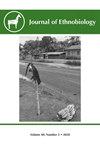Weather Magic as Environmental Knowledge in Southern Vanuatu
IF 2.9
3区 社会学
Q1 ANTHROPOLOGY
引用次数: 0
Abstract
Abstract. This paper presents weather magic practices from the islands of Tanna and Aneityum, in southern Vanuatu, and highlights how this phenomenon is a critical domain of Indigenous environmental knowledge, particularly knowledge involving plants. Recent literature suggests that diverse cultural systems, such as music, can be viewed as domains of environmental knowledge, and we propose that magical systems should be afforded the same recognition. Although anthropological work in Melanesia has historically featured various magical practices, relatively little has been said about how these have been used to influence or understand the weather, and even less has been presented directly by Indigenous weather magic practitioners, who are co-authors on this paper. In this contribution, we intersperse anthropological and ethnobotanical commentary with verbatim narratives provided by three local experts in weather magic from southern Vanuatu, including oral histories, contemporary narratives, and the results of ethnobotanical surveys. The detailed knowledge that weather magic practitioners on these islands hold regarding their local environment represents an important means of transmitting not only cultural heritage, but also botanical knowledge, the maintenance of which may be critical for current and future conservation efforts. This research documents rich cultural traditions of local and global significance which are worthy of the attention and preservation afforded to other forms of Indigenous environmental knowledge. The goals of magic and those of science are not necessarily inherently opposed, and we show that magical practice can indeed involve and even preserve a detailed and powerful mode of knowing the environment.天气魔法是瓦努阿图南部的环境知识
摘要本文介绍了瓦努阿图南部的Tanna岛和Aneityum岛的天气魔法实践,并强调了这种现象如何成为土著环境知识的关键领域,特别是涉及植物的知识。最近的文献表明,不同的文化系统,如音乐,可以被视为环境知识的领域,我们建议魔法系统应该得到同样的认可。尽管美拉尼西亚的人类学工作在历史上以各种魔法实践为特色,但相对而言,很少有人说这些是如何被用来影响或理解天气的,甚至更少是由土著天气魔法从业者直接提出的,他们是本文的共同作者。在这篇文章中,我们将人类学和民族植物学的评论与三位来自瓦努阿图南部的当地天气魔法专家提供的逐字叙述穿插在一起,包括口述历史、当代叙述和民族植物学调查的结果。这些岛屿上的天气魔法从业者对当地环境的详细了解不仅是传播文化遗产的重要手段,也是传播植物学知识的重要手段,对这些知识的维护可能对当前和未来的保护工作至关重要。这项研究记录了具有地方和全球意义的丰富文化传统,值得像其他形式的土著环境知识一样得到重视和保护。魔法的目标和科学的目标并不必然是内在对立的,我们表明,魔法实践确实可以涉及甚至保留一种了解环境的详细而有力的模式。
本文章由计算机程序翻译,如有差异,请以英文原文为准。
求助全文
约1分钟内获得全文
求助全文
来源期刊

Journal of Ethnobiology
Social Sciences-Anthropology
CiteScore
4.80
自引率
3.40%
发文量
21
审稿时长
>12 weeks
期刊介绍:
JoE’s readership is as wide and diverse as ethnobiology itself, with readers spanning from both the natural and social sciences. Not surprisingly, a glance at the papers published in the Journal reveals the depth and breadth of topics, extending from studies in archaeology and the origins of agriculture, to folk classification systems, to food composition, plants, birds, mammals, fungi and everything in between.
Research areas published in JoE include but are not limited to neo- and paleo-ethnobiology, zooarchaeology, ethnobotany, ethnozoology, ethnopharmacology, ethnoecology, linguistic ethnobiology, human paleoecology, and many other related fields of study within anthropology and biology, such as taxonomy, conservation biology, ethnography, political ecology, and cognitive and cultural anthropology.
JoE does not limit itself to a single perspective, approach or discipline, but seeks to represent the full spectrum and wide diversity of the field of ethnobiology, including cognitive, symbolic, linguistic, ecological, and economic aspects of human interactions with our living world. Articles that significantly advance ethnobiological theory and/or methodology are particularly welcome, as well as studies bridging across disciplines and knowledge systems. JoE does not publish uncontextualized data such as species lists; appropriate submissions must elaborate on the ethnobiological context of findings.
 求助内容:
求助内容: 应助结果提醒方式:
应助结果提醒方式:


